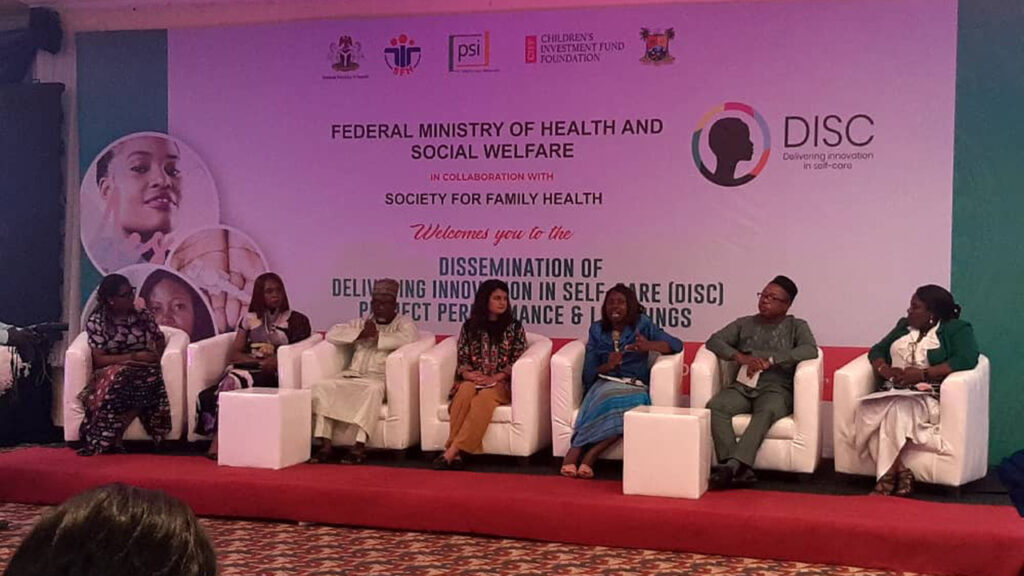
The Federal Government has developed and disseminated a national self-care guideline on family planning services in 25 states in the country, as well as established a National Self-Care Coordination Committee under the National Reproductive Health Technical Working Group.
Officials of the Federal Ministry of Health (FMOH) disclosed this during a roundtable and dissemination close-out on Delivering Innovation in Self-Care (DISC) in Lagos, to discuss the interventions and challenges encountered, while upscaling demand generation, service delivery and catalytic impacts in the country.
They said the government has created an enabling policy environment for the introduction and scale-up of DISC, which was implemented to empower women of sexual and reproductive age to adopt the use of contraceptive self-care methods like DMPA-SC self-inject (SI) which got boosted from 13 to 40 per cent.
The initiative is part of the five-year DISC project, which was in collaboration with the federal and state governments, the Society of Family Health Nigeria, Population Service International and funded by Children Investment Fund Foundation (CIFF).
The project introduced Depot Medroxyprogesterone Acetate Subcutaneous (DMPA-SC), a new formulation of the popular intramuscular injectable, Depot Medroxyprogesterone Acetate Intramuscular (DMPA-IM) that allows self-injection, which has the potential to reduce access-related barriers for women, increase contraceptive continuation rates, and enhance women’s autonomy.
According to the World Health Organisation (WHO) unintended pregnancies can further lead to cycles of high fertility, lower educational and employment potential and poverty, while modern methods of contraception have a vital role in preventing unintended pregnancies.
Director, Family Health, Federal Ministry of Health, Mr Lawrence Chinedu Anyanwu, said the government is making necessary funds, technical and material resources available to ensure that the interventions under the project are sustainable.
He said the Federal Government has collaborated with the Society for Family Health and CIFF to introduce interventions that keyed into government programme aimed at scaling up quality family planning services to Nigerians of reproductive age.
“We will continue to sustain this intervention, especially now that we have seen the results and learnt a lot of lessons from it.”
We have also seen the positive impacts, so we will continue with SFS to build on these successes while working with other partners to further scale up the positive part of this project,” Anyanwu added.
Anyanwu emphasised that through the Federal Government’s commitment, it was able to sustain the implementation of key activities that have given the results that are being disseminated.
“Our interventions allowed stakeholders from family health, federal and state ministries of health to work together in expanding access to Nigerians of reproductive age to quality family planning services and other self-care products and services to meet their sexual and reproductive health needs,” he said.
Another representative of the ministry, Mrs Patricia Isikong, showcased the impact of DISC intervention in Nigeria and the proven high-impact self-injection practices into national systems for continuity and scale up.
According to Isikong, Nigeria accounts for 14 per cent of global maternal deaths with an infant mortality rate of 67 per 1,000 live births and 132 per 1,000 under five.
The Deputy Managing Director, Society for Family Planning, Dr Jennifer Anyanwu, said empathy-based training helps health providers develop strategies to prevent and address health concerns.
“The innovation in self-care project is all about providing women in Nigeria with an avenue to empower them in the area of family planning using a product called DMPA-SC, which is a self-injection product. This allows for women and their partners to go to a facility to learn, choose family planning methods, use it in the comfort of their homes,” she said.
She noted that the society has been working with the Federal Government on adjusting policies around self-care and creating an enabling environment for women to access the right products and services.
Deputy Team Lead, DISC project, Mopelola Raji, explained that DISC project is being implemented in Nigeria, Malawi and Uganda. She said Nigeria has implemented the project in 15 states with incredible results, as self-injection increased from 13 per cent in 2021 to 40 per cent in the first quarter of 2024.
“The essence of the project is to ensure that women can plan their reproductive health needs and choices based on what they want. They can get pregnant when they want, afford the lifestyle they want to live, and effectively space their childbearing and prevent unintended pregnancy,” she said.












